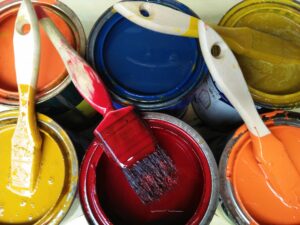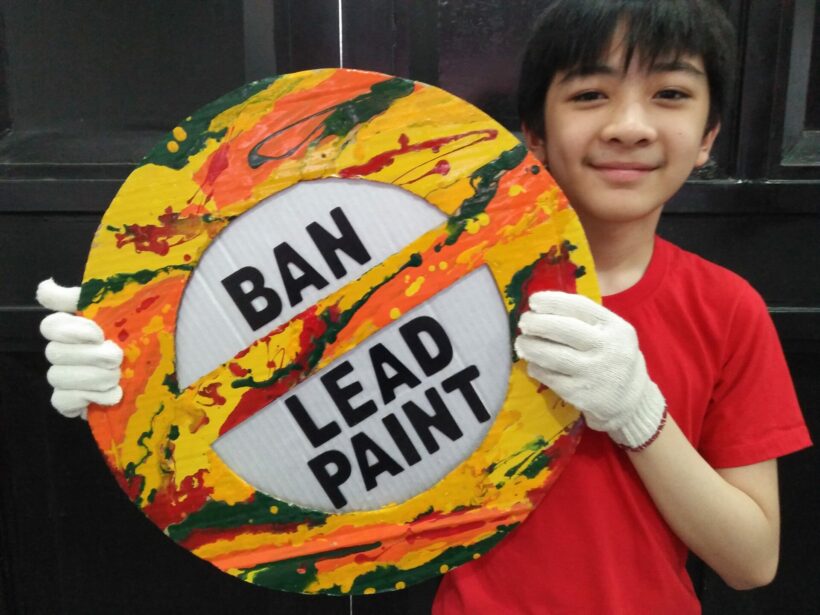23 December 2023, Quezon City. The EcoWaste Coalition, a non-profit environmental health organization, lauded the Chemical Control Order (CCO) banning lead — a potent neurotoxin causing irreversible damage to children’s brains — in the production of paints as the groundbreaking regulation marks its 10th anniversary today.
Issued by the Department of Environment and Natural Resources – Environmental Management Bureau (DENR-EMB) on December 23, 2013, the group, in a statement released 10 years ago, described the broadly supported regulation as “a splendid Christmas gift to our children.”

Also referred to as DENR Administrative Order No. 2013-24, the CCO provided for a three-year phase-out period for architectural, household, and decorative paints (2013-2016), and a longer six-year phase-out for paints used in industrial applications (2013-2019). It also established a maximum of 90 parts per million (ppm) total limit for lead in all types of paints, the strictest regulatory standard for lead in paint.
The issuance of the CCO prompted paint makers to replace lead-based pigments, driers, and anti-corrosive agents with non-lead alternatives thereby contributing to the decreased importation and consumption of lead chromates and other leaded raw materials. As confirmed by the EMB, the agency has stopped issuing importation permits for such materials intended for use in paint manufacturing.
A case study prepared with inputs from the government, industry, and civil society stakeholders for the Global Alliance to Eliminate Lead Paint (or the Lead Paint Alliance) identified several factors that contributed to the successful implementation of the CCO, including “data on lead in solvent-based paints generated by the civil society that provided evidence of a pressing problem requiring immediate and collective action, multi-faceted efforts to raise awareness about the issue, an industry-wide shift that created the impetus for all companies to transition to lead-safe paint formulations, and the government’s commitment to a multi-stakeholders approach.”
The Philippine Association of Paint Manufacturers (now called the Philippine Paint and Coatings Association or PPCA) has actively promoted the CCO to its member companies, providing them with venues like workshops to understand in-depth the hazards of lead, the need to remove lead in paint formulations, and the availability of alternatives. As confirmed by PPCA, affiliated paint makers have all transitioned to lead-free paint production.
Aside from providing inputs to policy and technical deliberations, the EcoWaste Coalition took on the role of a watchdog group, conducting lead paint studies, tracking the sale of non-compliant products in the market, duly notifying regulatory bodies and companies, and creating media stories for greater public awareness and to encourage regulatory action. The group’s latest study in October 2023 still found lead-containing paints produced by non-PPCA-affiliated companies in the market, providing a strong justification to strengthen compliance monitoring and enforcement mechanisms to uphold the lead paint ban.
According to the EcoWaste Coalition, the CCO contributes to the protection of the human rights of groups most vulnerable to the adverse effects of lead exposure, particularly children, women, and workers. The CCO protects children, including babies in the womb, from being exposed to lead in paints and other sources, which can negatively impact their right to good health and a better future, noting lead exposure can bring about reduced economic productivity and earning potential.
For the workers, eliminating lead is essential to reduce occupational exposures and avoid health problems linked with chronic lead exposure, including increased risk of hypertension, heart disease, and reproductive health issues for women and men, the group said.
The CCO has also resulted in the issuance of related national and local policies, including Department of Education (DepEd) Order No. 4, s.2017, Department of the Interior and Local Government (DILG) Memorandum Circular No. 2018-26 and an unnumbered Department of Social Welfare and Development (DSWD) directive requiring the mandatory use of lead-safe paints by schools, local government units (LGUs), and residential and non-residential social welfare facilities, respectively. Last April 2023, the DILG issued an advisory reiterating the use of lead-safe paints by LGUs.
While third-party certification is not integrated into the CCO, the promulgation of the policy led to the birth of a voluntary Lead Safe Paint Certification® program initiated by the International Pollutants Elimination Network (IPEN) with support from EcoWaste Coalition and the PPCA. This third-party certification program verifies and certifies that a paint brand has less than 90 ppm lead allowing it to use the Lead Safe Paint® logo, a visual tool that can assist consumers in making an informed choice when purchasing paints.
To date, four local paint manufacturers have successfully passed the rigorous Lead Safe Paint ® verification procedures conducted by SCS Global Services, the US-based certification body, including Pacific Paints (Boysen) Philippines, Inc., Davies Paints Philippines, Inc., Sycwin Coating and Wires, Inc., and Asian Coatings Philippines, Inc. Another company, Roosevelt Chemical, Inc. (maker of Triton paints), is undergoing certification.
In 2021, the CCO received the prestigious Future Policy Award (special category on lead in paint) given by the Germany-based Word Future Council for being the first Southeast Asian country to successfully implement legislation towards lead-safe paint.
Building on campaign successes so far and with the support from the paint industry, the EcoWaste Coalition and IPEN are advocating for international control on the trade of lead chromates, the most common lead-based pigments, by listing lead chromates and paint products containing them under the Rotterdam Convention.
As the work towards the elimination of lead-containing paints continues locally and globally, the EcoWaste Coalition earnestly thanked its partners in this shared advocacy to protect human health and the environment from toxic lead, particularly IPEN, PPCA, DENR-EMB, DOH-FDA, DILG, DSWD, DTI and the LGUs, as well as the Lead Paint Alliance.
Reference:
https://chemical.emb.gov.ph/wp-content/uploads/2017/03/DAO-2013-24-CCO-Lead.pdf










